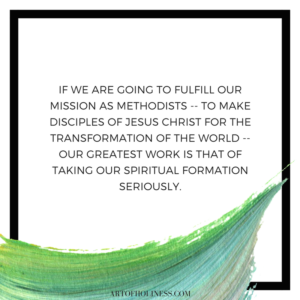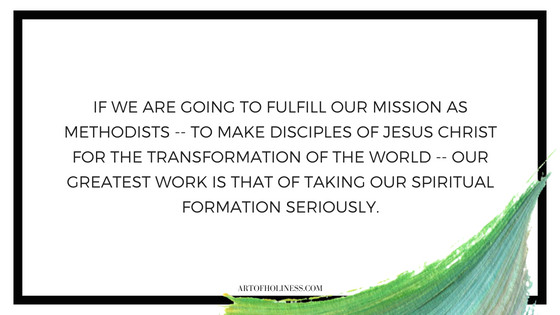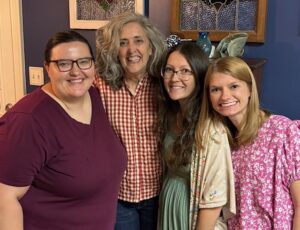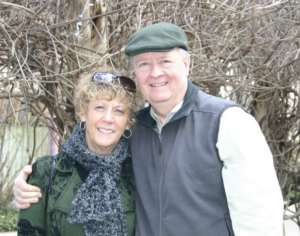 “The mission of the church is to make disciples of Jesus Christ for the transformation of the world.”
“The mission of the church is to make disciples of Jesus Christ for the transformation of the world.”
This is the mission of United Methodists — to make disciples, as Dr. Robert Mulholland would say, “for the sake of others.” To make disciples is more than getting people saved, though that is obviously a critical beginning. The heart of Methodism is not social justice or creation care, though those things matter. It is much more than hosting attractive worship experiences. Our mission is to care for the spiritual formation of people at the deepest levels, so that their personal transformation results in the transformation of the world.
Spiritual formation is intentional transformation. It is God’s intent that we grow. Spiritual formation is growth that happens on purpose. Do Methodists today understand that our theological bent calls us to go someplace spiritually, to be formed into the likeness of Jesus Christ? Do we understand that we are making disciples of Jesus? Are we fostering spiritual hunger for Christ alone?
Spiritual formation is a matter of the heart. The place where the shaping or forming happens is the heart. In the Bible, we hear these almost bizarre (for our contemporary ears) statements about God wanting to circumcise our hearts. The point is that God wants to change the shape of us. He wants to conform us into the image of Jesus — to make us more loving, more gentle, more joyful, more peaceful, more gracious, more faithful, more trusting … more disciplined. At its core, Methodism is about using spiritual discipline to be shaped into the character of Christ. Do we preach as if that’s so? Are we people of one Book, a book designed to shape us into Kingdom-minded people?
Spiritual formation happens for the sake of others. Methodism is designed to be both evangelistic and global. We do not apologize for our belief in the radical notion that our brand of faith has power to change the world. Further, God’s intent is not just to form each of us spiritually, but to make us partners in the work of transforming the world. Nothing less, nothing else. Do our people have a global vision, or are we stuck on our own cultural values, unable to see how God is moving in other parts of the world? Do we truly believe ourselves to be globally connected to each other by the power of the Holy Spirit?
Spiritual formation is fueled by spiritual discipline. As I’ve said already, Methodists major on the disciplines. It is our contribution to the Body of Christ — this idea that through very practical habits, we can form an intimate relationship with Christ even as he forms us into his likeness. The means of grace are not the basis of our salvation (don’t mistake them for works righteousness), but they are a gift of God that allows us to participate in the process of our ongoing spiritual growth. In our chaotic and distracted world, spiritual disciplines like fasting and prayer may seem arcane; we want to discount them because we are already too busy doing things for Jesus. But are we busy enough doing things that place us in the presence of Jesus? Are we learning to hear his voice? Are we practicing that art daily, so that hearing from God becomes more and more part of our cultural distinctive?
As it turns out, disciplines are not for people who have too much time on their hands, but for people exactly like us. Busy, distracted people. Do Methodists understand that it is in our DNA to be deeply, intimately, passionately connected to Christ, and that our spiritual practices are designed to help us hear the voice of God?
I suspect that the political discussions within the UMC have distracted the corporate body and kept us from being on mission. I suspect they have distracted us personally (note: hand-wringing is not a spiritual discipline). For the proliferation of politics within our tribe, we have lost sight of what is most central to our existence: to make disciples of Jesus Christ for the transformation of the world.
I want to call Methodists to return to the fundamentals. I want to see Methodists passionate again about centering on Jesus and on the disciplines that keep us grounded, particularly steeping ourselves in prayer and the scriptures. I want to see a move of the Holy Spirit in our day that transcends cultural conversations and revives our corporate/global spirit. I envision a move of personal prayer, fasting, scripture study and corporate accountability that restores our hunger for our mission. Yes, I want to see us loving our neighbors well, but I want to see those acts of love and kindness rooted in our passion for what breaks God’s heart, not as an escape from it.
I pray for a great move of the Holy Spirit to sweep among us as we get serious again about working out our salvation with fear and trembling. I pray that by the grace of God and the power of the Holy Spirit, the mission of Methodists would be advanced toward its completion on the power of its people’s faith, so that one day we can all stand together in his unhindered presence with nothing left to do but worship.
If we are going to fulfill our mission as Methodists — to make disciples of Jesus Christ for the transformation of the world — our greatest work is that of taking our spiritual formation seriously, not just for the sake of our own souls but for the sake of others … that the world might know that Jesus Christ is Lord.








